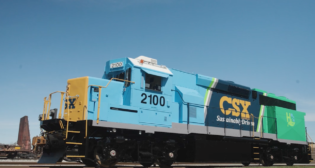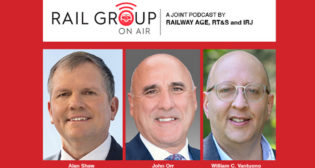
Fitch Affirms KCS at ‘BBB’
Written by William C. Vantuono, Editor-in-Chief
Fitch Ratings has affirmed Kansas City Southern’s Long-Term Issuer Default Rating (IDR) and senior unsecured rating at ‘BBB.’ In addition, Fitch has affirmed KCS’s Short-Term IDR and senior unsecured rating at ‘F2.’ Fitch’s Rating Outlook is ‘Stable.’
Fitch said its affirmations “follows KCS’s announcement that it will be acquired by Canadian National (CN) in a transaction valued at $33.7 billion. The announcement comes after KCS had previously agreed to be acquired by Canadian Pacific (CP) for $28.9 billion. The valuation for the transaction is high at more than 20x KCS’s projected 2020 EBITDA. The transaction must be approved by the Surface Transportation Board (STB) and Mexican regulatory bodies before closing. The companies expect the transaction to close in mid-2022. Fitch does not publicly rate CN, but believes the company has a stronger credit profile than KCS.”
Following is the full, unedited text of Fitch’s analysis:
KEY RATING DRIVERS
Pro-forma Leverage: CN plans to issue roughly $19.3 billion in new debt and assume roughly $3.8 billion in debt from KCS’s balance sheet. The combined entities will carry roughly $34 billion in total debt upon transaction close. Fitch estimates that pro-forma leverage for the combined companies will be above 4x, which Fitch considers high for a ‘BBB’ rating. CN estimates that leverage will reach 3.5x by YE 2023, which Fitch views as a potentially aggressive, but achievable target.
Near-term leverage is likely to be higher under CN’s proposed bid than it would have been following the planned CP acquisition. CP planned to raise roughly $8.6 billion in new debt under its proposal. This risk is partly offset by greater scale. CN is roughly twice the size of CP on a top-line basis. The company intends to suspend its normal share repurchase program and will direct FCF towards debt repayment. Both KCS and CN generate strong operating margins and are highly cash flow generative. Fitch expects the combined companies will produce sufficient cash flow to readily delever following the acquisition.
Combined Networks a Positive: As with the planned acquisition by CP, Fitch views the combination of CN and KCS’s networks as strategically sound. Combining KCS’s strengths in Mexico and the Midwest with CP’s Canadian and central U.S. network will give the combined entity a broad reach, and is likely to create more efficient routes for multiple freight flows. Both carriers utilize precision-scheduled railroading philosophies that have driven solid margins and sustained free cash flows.
CN is targeting C$1 billion in EBITDA synergies resulting from new revenue and cost saving opportunities. While Fitch’s modelling is conservative to CN’s public estimate, the combination is likely to produce efficiencies that should drive upside for margins.
Regulatory Risks: There is a greater possibility that the CN/KCS combination will receive regulatory scrutiny from the STB relative to the CP proposal. A combined CP/KCS would have remained one of the smaller Class I rails; however, the combined CN and KCS will be larger on a top-line basis than either CSX or Norfolk Southern.
In a late April statement, the STB said the CP/KCS merger could be reviewed under the pre-2001 rail merger rules, which effectively state that a combination of rail companies would be scrutinized to ensure that the merger did not adversely affect competition, whereas the post 2001 rules require any transaction to enhance competition. While CP had sought a waiver from the STB to allow its acquisition to be viewed under the old rules, CN is making the case that it can win regulatory approval under the post 2001 framework.
In order to reduce risks to KCS’s shareholders, and because it may take some time to receive regulatory approval from the STB, the transaction will use a voting trust structure. A newly formed independent voting trust will acquire KCS, at which point, existing KCS shareholders will receive compensation for the transaction. While under trust ownership, KCS will remain separate from CN, retain its existing management team, and will be overseen by an independent trustee. The two companies will be integrated after receiving approval from the STB, which could happen in the second half of 2022. If the transaction is rejected by the STB during the trust ownership period, CN will be able to sell KCS to another bidder or initiate an IPO.
The STB recently issued a ruling denying CN’s motion to complete the transaction using the voting trust structure, citing the motion as incomplete. The ruling dismissed CN’s motion without prejudice to a new filing. CN has stated that the dismissal simply reflects that the initial motion did not include an official merger agreement with KCS’s since it was not available at the time of filing. CN has since filed the merger agreement with the STB, and review of the trust structure is ongoing. CN is obligated to pay KCS a $1 billion fee if the STB ultimately rejects the use of a voting trust.
KCS Affirmed at ‘BBB’ in March 2021: Fitch affirmed KCS’ Long-Term IDR at ‘BBB’ in March 2021 and revised the Rating Outlook to Stable from Negative. The Outlook was revised to negative largely due to economic uncertainty surrounding the coronavirus pandemic, the company’s exposure to cyclical end markets, and steep declines in volume. Performance relative to Fitch’s initial forecast exceeded expectations as KCS, and the railroad industry as a whole, was able to recover volumes at a faster pace than initially expected, leading to the stabilization of the outlook earlier this year.
In addition, the company took advantage of reduced volumes to bring forward certain cost cutting and efficiency initiatives, such as implementing longer trains, which allows for fewer trains starts, reduced headcount, and less fuel consumption. Looking forward, revenue and profitability are projected to be above pre-pandemic levels by the end of 2021, aided by continued end market recovery and continued materialization of cost savings from the Precision Scheduled Railroad (PSR) initiative.
KEY ASSUMPTIONS
Fitch’s Key Assumptions Within Its Rating Case for the Issuer Include:
• The transaction closes in mid-2022 as projected by the companies.
• CN actively de-levers following the acquisition, directing FCF to debt repayment.
• Volume and revenue growth moderate after strong recovery in 2021.
• PSR drives operating margin increase in 2021 and 2022.
• FCF margins in the high single digits.
RATING SENSITIVITIES
Factors that could, individually or collectively, lead to positive rating action/upgrade:
• Total adjusted debt/EBITDAR trending toward 2.0x.
• Sustained FCF margins in the mid-to-high single digits.
• Operating margins sustained near current levels or modestly improving over the next one to two years.
Factors that could, individually or collectively, lead to negative rating action/downgrade:
• Delays in planned de-leveraging causing debt/EBITDA to remain above 3x for more than three years.
• A severe drop off in demand for cargo.
• EBITDAR margins falling toward, or below, the 40% range and expectations for sustained negative FCF.
BEST/WORST CASE RATING SCENARIO
International scale credit ratings of Non-Financial Corporate issuers have a best-case rating upgrade scenario (defined as the 99th percentile of rating transitions, measured in a positive direction) of three notches over a three-year rating horizon; and a worst-case rating downgrade scenario (defined as the 99th percentile of rating transitions, measured in a negative direction) of four notches over three years. The complete span of best- and worst-case scenario credit ratings for all rating categories ranges from ‘AAA’ to ‘D’. Best- and worst-case scenario credit ratings are based on historical performance. For more information about the methodology used to determine sector-specific best- and worst-case scenario credit ratings, visit https://www.fitchratings.com/site/re/10111579.
REFERENCES FOR SUBSTANTIALLY MATERIAL SOURCE CITED AS KEY DRIVER OF RATING
The principal sources of information used in the analysis are described in the Applicable Criteria.
ESG CONSIDERATIONS
Unless otherwise disclosed in this section, the highest level of ESG credit relevance is a score of ‘3’. This means ESG issues are credit-neutral or have only a minimal credit impact on the entity, either due to their nature or the way in which they are being managed by the entity. More information on Fitch’s ESG Relevance Scores.



